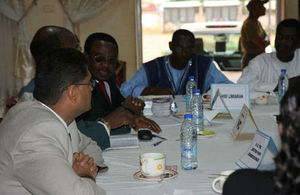British High Commissioner visits Bamenda University
Maiden visit at the newly created University of Bamenda

High Commissioner & Varsity dons brainstorming
Friday, 19th July 2013 at 3:45 p.m marked the visit of the British High Commissioner to the University of Bamenda. Complementing the 30th anniversary of Chevening in Cameroon and accompanied by the Chevening Alumni president -Ephraim Banda Ghogomo, the Press and Public AffairsOfficer at the High Commission - Mireille Djob, Emmanuel Sanyi Sanyi (Chevening alumnus) and Miki Gilbert (Chevening scholar on research to Cameroon), the High Commissioner saw the need to have a working session with the university authorities. The visit was to identify the pertinent needs of the university and explore possibilities of making the institution an outstanding 21st century university or the ‘University of the Future’ as the authorities Christian it.
After a welcome note by Prof. Etienne Zé AMVELA on behalf of the Vice chancellor, the High Commissioner shaped the raison d’être of the visit to tie within the framework of establishing a credible partnership which led to a brief situational analysis of the university. Some of the challenges highlighted included: limited technical expertise; the absence of a modern library, deplorable ICT services that hinder research; increasing teacher-centered approaches; no laboratories with over 345 students depending on borrowed laboratory equipments and a dependency ratio of 50 students to one microscope as well as limited facilities to care for the disable within the university.
Based on the above situation, some solutions were identified as a way to close the gap. Some of the requests as captured encompassed the need for in-service training for the staff; improve the ICT services of the institution in order to boost research and enhance the management of student records as well as exams; provide the platform for visiting lecturers from key universities in the United Kingdom; inherent need for cooperation between the University of Bamenda and those in the UK to facilitate teacher-student exchange programs as well as harmonize the university’s credit system with that of UK; equipment of the laboratory and the library and the need to improve the learning conditions of the disable as well as increase the participation of women in some key departments and faculties.
Reacting to the needs of the university as presented by the varsity dons, the British High Commissioner to Cameroon H.E Bharat Joshi indicated that the High Commission has limited finances at its disposal. Responding to the need for a joint program with universities in the UK, the British Diplomat assured the varsity authorities that it is possible but very much dependent on the arrangements made by the universities involved through a memorandum of understanding. He also urged them to manifest interest through the High Commission and also write to the UK-based universities that fit within the framework of their vision. He also underscored the need to work with some major British NGOs like VSO as well as set up a strategic vision for the university and solicit for a strategic partnership. With regards to joining the Commonwealth, the High Commissioner noted “we need to be an intelligent customer of the Commonwealth”. Furthermore, he acknowledged the interest of the High Commission in improving the conditions of the disable and indicated that they may setup a scheme to support.
Finally, he emphasized their interest in advancing the rights of women through a scholarship scheme. Notwithstanding, he stressed on the quality of the candidates as key eligibility conditions to benefit from the scheme.
The visit was also an avenue for Her Majesty’s Representative to Cameroon to offer a consignment of books to further equip the university Library. The day ended with smiles on faces of the varsity dons, group photographs as well as constrained moments of informal interaction.